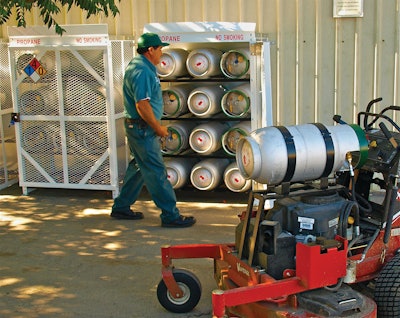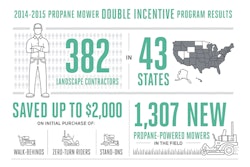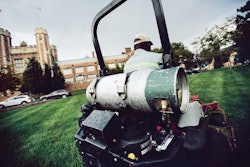
When looking ahead at what propane has to offer the landscape industry over the next 10 months, it’s almost impossible to do so without looking back at the groundwork laid throughout 2014. Efforts were made on multiple fronts to increase awareness and acceptance of propane power as the fuel of choice for more landscapers.
A growing list of propane-powered mowers and multiple programs have combined over the past year to help contractors consider the alternative fuel more seriously than ever before. In short, thanks to hard work being done in the propane industry throughout 2014, the outlook for 2015 is a positive one.
More mower models
Contractors are benefiting from a growing abundance of propane-powered commercial mowers to choose from. The growing number of propane mower models really picked up steam in 2013, when propane received some noteworthy buy-in from large players in the market.
Kohler launched its Command Pro EFI propane engine, marking the first OEM-built EFI propane engine to enter the market. Also in 2013, two leading equipment manufacturers, Exmark and Toro, adopted the Kohler engine and developed dedicated propane-powered mowers, while John Deere made available 20-plus mower options approved for dealer conversions. Several other manufacturers—such as Gravely and Wright—took the same approach shortly thereafter. The spike in manufacturers offering propane-powered models totaled 17 OEMs selling more than 75 options to the market by year’s end.
That growth trend continued throughout 2014 as EFI propane has been adopted across an even wider range of manufacturers offering additional propane-powered models. Most importantly, propane mowers are not just available in zero-turn models. Wide-area walk-behind and stand-on mowers powered by propane are now available, which will bring the alternative fuel option to a wider segment of the market than in the past.
In all, this increased acceptance and reliance on propane as a power source for the commercial landscape market equates to roughly 135 or more propane-powered mower models and EPA-certified conversion kits, including new certified conversion kits coming from Blossman Services Inc., EnviroGard, Hendrix Industrial Gastrux and Metro Lawn. The growth in this industry is indication that propane is a proven fuel that can reduce emissions and operating costs for customers.
2015 is setting up to be another year of mower model growth and market expansion for propane. The Kohler 824cc propane engine launched at GIE+EXPO this past fall should continue to increase the number of OEMs offering propane-powered mowers. Additionally, PERC is committed to increasing awareness of propane’s benefits to additional markets, including golf, where propane can meet customers’ alternative-fuel needs in a similar fashion.
Propane programs a big hit
In an effort to get more contractors to consider making the switch from gasoline to propane-powered equipment, PERC recently doubled its Propane Mower Incentive Program to help contractors digest the upfront costs associated with making the fuel source switch. The double incentive, first announced in October 2014, is expected to have a dramatic impact on new propane customers in 2015.
In fact, the program received such an overwhelmingly positive initial reception from contractors that PERC extended the timeframe for the double incentive, now available through March 31, 2015. Originally set to expire at the end of 2014, program participants are able to earn $2,000 toward the purchase of a new propane-powered mower and $1,000 toward a qualified conversion.
In October alone, after the double incentive was announced, PERC received applications from 76 contractors for more than 200 pieces of equipment. That marked the most applicants the program received in a single month, dating back to its inception in 2012. In 2014, almost 600 contractors have received incentive dollars in exchange for data about their usage and mower performance.
This heightened interest in applications is proof that contractors are beginning to understand the long-term value of converting their fleets to propane. The double incentive, which contractors can still sign up for, is in place to help them realize an even greater ROI by helping minimize the impact of some of those upfront equipment costs.
Another program put in place in 2014 that should pay dividends for the propane industry in 2015 is the PERC suite of cost calculator tools. The calculator tool, available at propanecostcalculator.com, estimates potential fuel savings and ROI for contractors using clean, American-made propane when compared to conventional fuels like gasoline and diesel.
Propane now a one-fuel solution
Also expected to continue into 2015 is the immense interest from contractors considering propane for use as their lone fuel solution. This allows contractors to extend their operating cost savings with propane into other parts of their equipment fleet beyond just mowers. Extending propane power to a contractor’s portable generators, like Generac’s LP3250 and LP5500 propane-powered portable generators, or to their on-road vehicles, like Ford’s F-550 pickup truck with a Roush CleanTech liquid propane autogas fuel system, do just that.
Roush CleanTech, a Ford Qualified Vehicle Modifier, and GM, in partnership with CleanFuel USA, offer truck options ideal for a landscape contractor. Ford F-250 and F-350 propane-autogas-powered trucks, as well as Isuzu trucks powered by propane autogas, are economical for day-to-day operations. For landscapers who need a heavier-duty truck, Ford F-450 and F-550 models and medium-duty GM 4500 chassis provide a larger frame and engine. EPA-certified bi-fuel conversion kits can also be installed on existing vehicles through aftermarket suppliers for landscapers who need to convert existing vehicles. Propane autogas trucks provide equivalent torque, performance and horsepower to gasoline counterparts, ensuring contractors will get the same results they’ve come to expect from their vehicle.
2015 looks to be a promising year for propane in the landscape industry. Contractors now have more propane-powered equipment options, incentive programs and other management tools in place to assist them as they consider converting from gasoline or diesel fuel to propane.



















